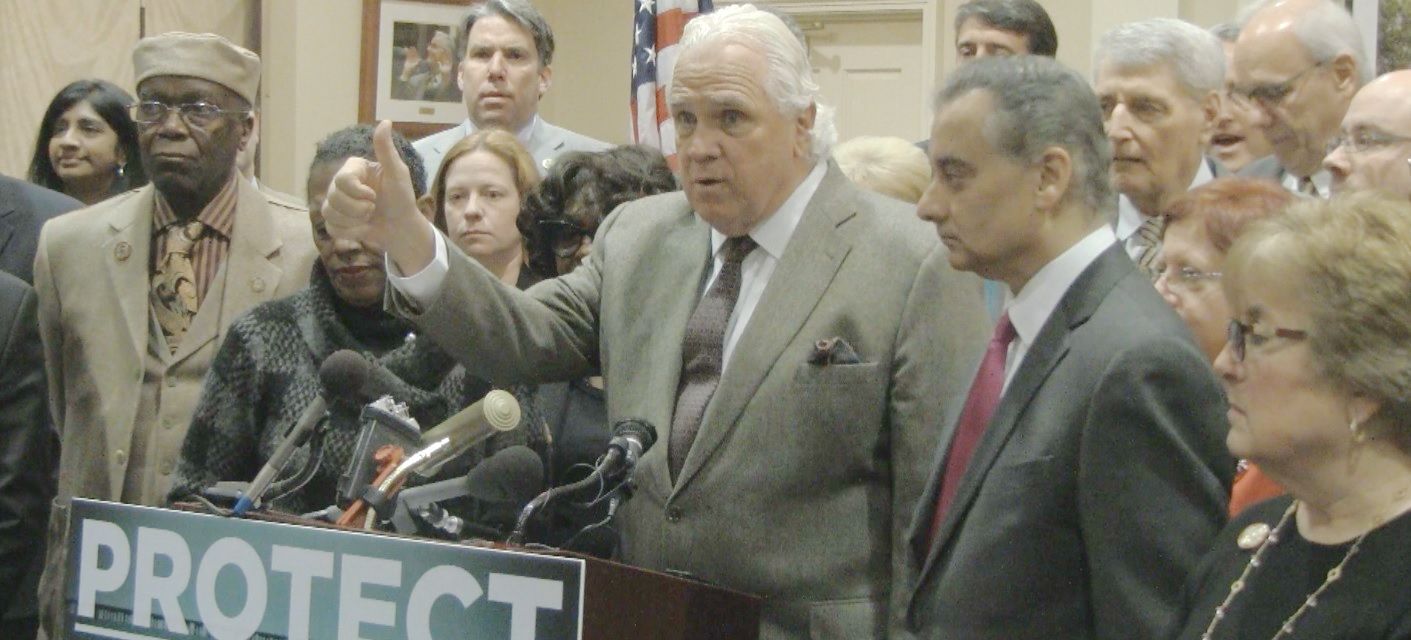Time for the State Prosecutor to step in this mess
Maryland Senator Mike Miller (MarylandReporter.com photo)
By Michael Collins
For MarylandReporter.com
Two intertwined issues exploded last week in what some consider a constitutional crisis, but this dispute is a bit overblown.
The showdown was initially between Gov. Larry Hogan and the legislature over whether or not Dennis Schrader could be paid after being appointed acting secretary of health. The plot thickened, however, when it was revealed that Schrader’s nomination was pulled before a vote because Senate President Mike Miller allegedly attempted to secure an unethical—possibly illegal—quid pro quo at the cost of confirmation.
The deal
Gov. Hogan nominated Schrader as health secretary during the legislative session. Miller repeatedly said that Schrader would be confirmed. But after the independent Maryland Health Care Commission (MHCC) approved Anne Arundel Medical Center’s (AAMC) request to perform cardiac surgery, things changed.
Miller considers AAMC’s cardiac surgery program a threat to the mega-facility being built in Prince George’s County to replace the decrepit Prince George’s Hospital Center. Miller still represents part of Prince George’s though he no longer lives there.
Schrader alleged that Miller promised him Senate confirmation on the condition that he overturns the decision of the independent MHCC to grant AAMC a certificate of need for cardiac surgery.
This is a continuation of an effort Miller began in public last summer, when he wrote to Prince George’s County elected officials ordering them to band together to stop AAMC’s application. He doubled-down last January when he held a press conference with Prince George’s officials at the State House to reiterate his call to quash AAMC’s application, and threatened to keep the legislature in session until he got his way.
The Maryland Health Care Commission (MHCC) was not intimidated and approved AAMC’s application, thus, Miller allegedly tried to leverage Schrader’s confirmation to undo their decision.
Constitutional issue
When Hogan withdrew Schrader’s nomination before a vote, Democrats anticipated that Schrader would be reappointed after the legislative session closed. They added a rider to the budget bill banning him from being paid if appointed in an acting capacity. The same applied to Planning Secretary Wendi Peters.
Hogan claims that the legislature’s rider is illegal, and Comptroller Peter Franchot’s office said it would pay Schrader. Democratic Attorney General Brian Frosh said paying Schrader is illegal. Treasurer Nancy Kopp, who signature also goes on the checks and is elected by the legislature, agreed and stopped the pay.
There are valid arguments to be made on both sides of the pay issue. But things get sticky when the quid pro quo enters the picture. Nobody questions the Senate’s constitutional “advise and consent” role. But should the public accept an “extort and consent” standard?
Impartiality compromised?
Hogan’s office thinks that Frosh is not the final word on the pay matter, preferring the advice of his own counsel. While Frosh is no doubt sincere in his legal opinion, he has given reason to doubt his impartiality.
While Frosh is more liberal than Miller, it was Miller who made him chair of the Senate Judicial Proceedings Committee. Frosh owes a lot to Miller.
Frosh personally represented Miller during a recent deposition as part of a lawsuit against the 2012 redistricting. While it was appropriate for his office to participate, it was unusual for the attorney general to serve as personal counsel, especially when two assistant attorneys general were on hand.
More recently, a three-judge panel in Baltimore ruled last week there is enough evidence to proceed to trial with the suit against the 2012 Congressional Districts, with one judge referring to the partisan redistricting as, “nefarious activities.”
Also last session, Frosh requested and received legislative authority—over Hogan’s veto—to sue President Trump without the governor’s approval. Frosh has used that authority with gusto leading Republicans in the legislature to recently accuse him of partisan grandstanding on the taxpayer’s dime and warn him to knock it off.
Between his overt partisanship and his loyalty to Miller, it is easy to see how critics can question Frosh’s impartiality on Schrader’s pay or any other dispute between the governor and legislature. Both are technically Frosh’s clients.
Impartial investigator
All this obscures the greater question: Did Senate President Miller engage in unethical or illegal activity when he allegedly tried to get Hogan and Schrader to interfere with the decisions of the statutorily independent MHCC?
Hogan’s communications director, Doug Mayer, thinks so, but hastened to add that the administration was not planning to file ethics charges against Miller. Still, rumors abound that the administration is weighing their options.
The Office of the State Prosecutor may initiate investigations independently to examine violations of state election and ethics laws, as well as misconduct by public officials, bribery, extortion, perjury, etc.
Legitimate questions have been raised about Miller’s alleged quid pro quo with Schrader, as well as his veracity under oath in the federal redistricting case, both of which could fall within the scope of the State Prosecutor.
Sadly, the public has been so inured by the self-dealing and back scratching in Annapolis that allegations of an unethical quid pro quo are utterly unremarkable. Call it the banality of corruption.
The corrosive nature of “politics as usual” in Annapolis is just another shovelful deepening the cynicism of the public.
While the state Court of Appeals ultimately will decide the constitutionality of the pay issue, it is time for state prosecutor to open an investigation to determine if the quid pro quo was in violation of ethics laws. If not the state prosecutor, then who?
Michael Collins can be reached at [email protected]

MarylandReporter.com is a daily news website produced by journalists committed to making state government as open, transparent, accountable and responsive as possible – in deed, not just in promise. We believe the people who pay for this government are entitled to have their money spent in an efficient and effective way, and that they are entitled to keep as much of their hard-earned dollars as they possibly can.

